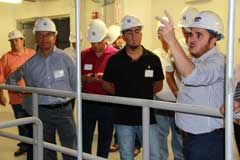August 25, 2014
Regional Animal Production Courses cover variety of topics

Thirty participants from 11 countries attended the Regional Animal Production Courses' poultry course Aug. 11-15 at the IGP Institute Conference Center in Manhattan. The institute partnered up with United States Soybean Export Council to offer the annual nutrition-based course.
"The partnership helps to continue the technical program under Regional Animal Production Courses that allows Latin Americans who import U.S. soybeans and soybean meal to better understand and utilize their nutritional benefits and how to improve their operations," says Carlos Campabadal, institute specialist in feed manufacturing and grain storage, and course manager.
Throughout the course, participants studied a broad range of topics, including digestive systems, poultry diets and approaches for reducing the toxic effects of mycotoxins in poultry, among others. One participant, Fernando Ramíerez, said that the course was good for any individual involved in the poultry industry.
"There are a lot of things that we know but because we do these tasks daily, we forget how important they are. We have a tendency to overlook the normal duties," Ramíerez says. "But when you come here, you start to notice all the details and you realize that you are missing some little things that we have a lot of impact on in production."
In addition to attending the lecture series from United States Soybean Export Council representatives and international grain program faculty, participants were able to tour the Kansas State University O.H. Kruse Feed Mill to expand their understanding of feed manufacturing and plant operations.
Production manager at Cargill Meats Central America, Jerónimo Bonilla, says that the tour was the most important part of the course for his team.
"We are now managing our own feed mills whereas before we would buy our feed. Touring the feed mill was a big opportunity for my business in particular," Bonilla says.
This is one example of the specialized trainings offered by the IGP Institute. In addition, the faculty also lead courses in grain marketing and risk management, flour milling and grain processing, and feed manufacturing and grain management.
